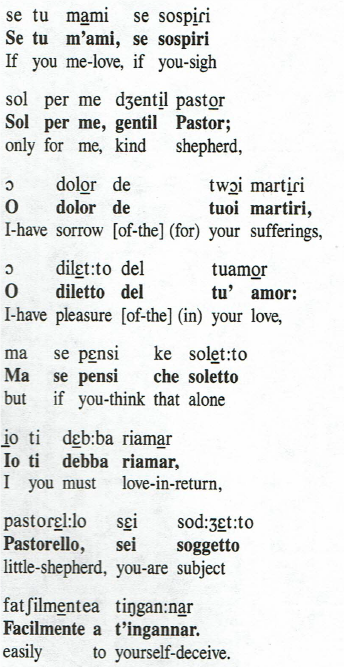Today I ran across an example of a category most people don’t know about: extremely close translations for opera singers.
I say “close” rather than “literal” because it’s not just about communicating the exact meaning, but also keeping words in mostly the same order so that you could basically nail the target sentence on top of the source sentence and they’d match up nicely. Here’s one from my own sheet music collection:

By conventional standards, this is the worst translation ever. But it’s just what singers need if they aren’t fluent in the language of the song (which many of them aren’t, especially if they’re just starting out). They have to know what each word means so they can sing them with appropriate emphasis and expression.
I unexpectedly ran across one of these today. I was searching for the libretto of The Merry Widow online to see how previous translators had handled a pun in the spoken dialogue. The first result was this.
Opening lines:
Verehrteste Damen und Herren | Most honorable ladies and gentlemen
Ich halt es für Gastespflicht, | I hold it as duty of a guest
Den Hausherrn dankend zu feiern, | The host of the house thankfully to fete
Doch Redner – das bin ich nicht! | Yet, a speaker – that I am not!
At first I thought it was just a terrible translation, because most of the libretto translations available online are intended for listeners and readers, rather than singers – in other words, they’re mostly “good” translations for people who want to read along with a recording or study the libretto as literature. I wondered if it was an MT (e.g. Google Translate) job but that didn’t seem quite right. The translator’s name appeared at the end and I looked her up – it turns out she was a language coach at Opera San Jose, which explains everything. She was not (as I initially suspected) a crazy person, but rather someone with the very specific job of helping opera singers understand their lines with maximum accuracy.
The reason I thought it probably wasn’t MT is that machine translators never follow source-language word order that closely. So you actually can’t get an MT to do a job like that. It’s programmed to translate into normal English word order, not the very close word order needed for these learning aids.
Here’s how 1. Google Translate and 2. DeepL render the opening lines:
1. Dearest ladies and gentlemen,
I consider it a guest obligation
To thank the host,
But speakers – I am not!
2. Dear Sirs,
I consider it a guest duty,
To celebrate the landlord with thanks,
But I’m not a talker!
I like how DeepL assumed it was a letter.
Anyway, both of those are terrible. But – happily for language coaches at the opera – neither of them is terrible in the right way.
1 comment